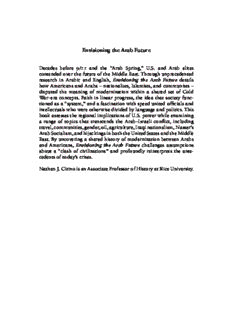
Envisioning the Arab Future: Modernization in US-Arab Relations, 1945-1967 PDF
Preview Envisioning the Arab Future: Modernization in US-Arab Relations, 1945-1967
Envisioning the Arab Future Decades before 9/1 1 and the “Arab Spring,” U.S. and Arab elites contended over the future of the Middle East. Through unprecedented research in Arabic and English, Envisioning the Arab Future details how Americans and Arabs – nationalists, Islamists, and communists – disputed the meaning of modernization within a shared set of Cold War– era concepts. Faith in linear progress, the idea that society func- tioned as a “system,” and a fascination with speed united offi cials and intellectuals who were otherwise divided by language and politics. This book assesses the regional implications of U.S. power while examining a range of topics that transcends the Arab–I sraeli confl ict, including travel, communities, gender, oil, agriculture, Iraqi nationalism, Nasser’s Arab Socialism, and hijackings in both the United States and the Middle East. By uncovering a shared history of modernization between Arabs and Americans, E nvisioning the Arab Future challenges assumptions about a “clash of civilizations” and profoundly reinterprets the ante- cedents of today’s crises. Nathan J. Citino is an Associate Professor of History at Rice University. Global and International History Series Editors Erez Manela, Harvard University John McNeill, Georgetown University Aviel Roshwald, Georgetown University The Global and International History series seeks to highlight and explore the convergences between the new international history and the new world history. Its editors are interested in approaches that mix traditional units of analysis such as civilizations, nations, and states with other concepts such as transnation- alism, diasporas, and international institutions. Titles in the Series Stefan Rinke , Latin America and the First World War Nathan J. C itino , Envisioning the Arab Future: Modernization in U.S.–A rab Relations, 1945– 1967 Timothy N unan , H umanitarian Invasion: Global Development in Cold War Afghanistan Michael Goebel , Anti- imperial Metropolis: Interwar Paris and the Seeds of Third World Nationalism Stephen J. M acekura , O f Limits and Growth: International Environmentalism and the Rise of “Sustainable Development” in the Twentieth Century Envisioning the Arab Future Modernization in U.S.–A rab Relations, 1945– 1967 NATHAN J. CITINO Rice University University Printing House, Cambridge C B2 8 BS, United Kingdom Cambridge University Press is part of the University of Cambridge. It furthers the University’s mission by disseminating knowledge in the pursuit of education, learning and research at the highest international levels of excellence. www.cambridge.org Information on this title: w ww.cambridge.org/9 781107036628 © Nathan J. Citino 2017 This publication is in copyright. Subject to statutory exception and to the provisions of relevant collective licensing agreements, no reproduction of any part may take place without the written permission of Cambridge University Press. First published 2017 Printed in the United States of America by Sheridan Books, Inc. A catalogue record for this publication is available from the British Library Library of Congress Cataloging-i n- Publication data Names: Citino, Nathan J., author. Title: Envisioning the Arab future: modernization in U.S.–Arab relations, 1945–1967 / Nathan J. Citino. Description: Cambridge, United Kingdom: Cambridge University Press, 2017. | Series: Global and international history | Includes bibliographical references and index. Identifi ers: LCCN 2016024241 | ISBN 9781107036628 (hardback) Subjects: LCSH: Arab countries – Foreign relations – United States. | United States – Foriegn relations – Arab countries. | Arab countries – Foreign relations – 20th century. | United States – Foreign relations – 1945–1989. | BISAC: HISTORY / United States / General. Classifi cation: LCC DS63.2.U5 C55 2016 | DDC 327.73017492709/045–dc23 LC record available at h ttps://lccn.loc.gov/2016024241 I SBN 978- 1- 107- 03662- 8 Hardback Cambridge University Press has no responsibility for the persistence or accuracy of URLs for external or third-p arty internet websites referred to in this publication, and does not guarantee that any content on such websites is, or will remain, accurate or appropriate. Cover credit: Gourna with Hathor, with plans and elevations in mountainous landscape with trees; Portrait golden tone gouache on scratchboard; 58h × 46w. © Rare Books and Special Collections Library, The American University in Cairo, Egypt For Sharon For there’s no such thing as the present: there is only a past, and a future at its beck and call. In our subconscious minds we are forever constructing our futures. – Ahmet Hamdi Tanpinar, The Time Regulation Institute Contents List of Figures page x List of Maps x i Acknowledgments x iii Note on Transliteration and Translation x v List of Abbreviations x vii Introduction: The “History of the Future” 1 1 The Age of Speed 1 5 2 Imperial Legacies 5 6 3 City of the Future 9 7 4 Yeoman Farmers 1 42 5 The People’s Court 1 77 6 The “New Men” 212 7 Changing Course 2 51 Conclusion: A Better Future 2 86 Bibliography 291 Index 317 ix Figures 1.1 Ruz al- Yusuf , December 10, 1947 page 36 1.2 Ruz al- Yusuf , September 7, 1944 4 9 1.3 Qarandal , April 9, 1952 51 1.4 King Husayn 54 3.1 Hassan Fathy at New Gourna 1 30 4.1 The East Ghor Canal, 1965 1 73 5.1 The People’s Court 1 86 6.1 William R. Polk, early 1960s 222 7.1 Yuri Gagarin in the “People’s Court” transcript 2 60 7.2 The American “system” in Asia 2 61 7.3 Al- Da‘wa , September 21, 1954 2 62 7.4 Leila Khaled 2 69 x
Description: